Heavier object - Study guides, Class notes & Summaries
Looking for the best study guides, study notes and summaries about Heavier object? On this page you'll find 565 study documents about Heavier object.
Page 4 out of 565 results
Sort by
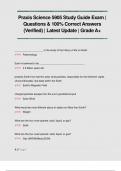
-
Praxis Science 5905 Study Guide Exam | Questions & 100% Correct Answers (Verified) | Latest Update | Grade A+
- Exam (elaborations) • 38 pages • 2024
-
- $12.99
- + learn more
_____________________ is the study of the history of life on Earth. : Paleontology Earth is believed to be _________________________________. : 4.5 billion years old protects Earth from harmful solar wind particles; responsible for the Northern Lights (Aurora Borealis); lies deep within the Earth : Earth's Magnetic Field charged particles escape from the sun's gravitational pull : Solar Wind What would be most different about an object on Mars than Earth? : Weight What are the four...

-
NCC: Biomechanics, Kinematics, MOI Questions and Answer | Latest Update 2024/202
- Exam (elaborations) • 21 pages • 2024
-
- $12.49
- + learn more
Kinematics ~~> study of energy transfer as it applies to identifying actual or potential injuries Biomechanics ~~> general study of forces and their effects on living tissue & the human body MOI ~~> how injuries occur as a result of how external energy forces in the environment are transferred to the body potential ~~> rest kinetic 2 | P a g e | © copyright 2024/2025 | Grade A+ Master01 | September, 2024/2025 | Latest update ~~> motion Newton's First Law ...
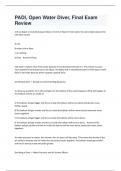
-
PADI, Open Water Diver, Final Exam Review with 100% Correct Answers 2024
- Exam (elaborations) • 25 pages • 2024
- Available in package deal
-
- $7.99
- + learn more
1) If an object is neutrally buoyant (does not sink or float) in fresh water, the same object placed into salt water would A sink. B either sink or float. C do nothing. D float. - Answer-D float. Salt water is heavier than fresh water because it has dissolved minerals in it. This means it causes more upward force (buoyancy) on an object. An object that is neutrally buoyant in fresh water would float in salt water because there is greater upward force. See Being a Diver I - Buoyancy and ...
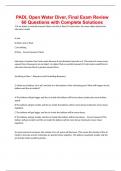
-
PADI, Open Water Diver, Final Exam Review 60 Questions with Complete Solutions
- Exam (elaborations) • 27 pages • 2023
- Available in package deal
-
- $10.49
- + learn more
PADI, Open Water Diver, Final Exam Review 60 Questions with Complete Solutions 1) If an object is neutrally buoyant (does not sink or float) in fresh water, the same object placed into salt water would A sink. B either sink or float. C do nothing. D float. - Correct Answer D float. Salt water is heavier than fresh water because it has dissolved minerals in it. This means it causes more upward force (buoyancy) on an object. An object that is neutrally buoyant in fresh water would float ...
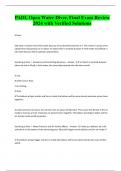
-
PADI, Open Water Diver, Final Exam Review 2024 with Verified Solutions
- Exam (elaborations) • 28 pages • 2024
- Available in package deal
-
- $10.99
- + learn more
PADI, Open Water Diver, Final Exam Review 2024 with Verified Solutions D float. Salt water is heavier than fresh water because it has dissolved minerals in it. This means it causes more upward force (buoyancy) on an object. An object that is neutrally buoyant in fresh water would float in salt water because there is greater upward force. See Being a Diver I - Buoyancy and Controlling Buoyancy. - Answer -1) If an object is neutrally buoyant (does not sink or float) in fresh water, the same...
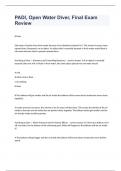
-
PADI, Open Water Diver, Final Exam Questions & Answers 2024.
- Exam (elaborations) • 27 pages • 2024
-
Available in package deal
-
- $11.99
- + learn more
PADI, Open Water Diver, Final Exam Questions & Answers 2024. D float. Salt water is heavier than fresh water because it has dissolved minerals in it. This means it causes more upward force (buoyancy) on an object. An object that is neutrally buoyant in fresh water would float in salt water because there is greater upward force. See Being a Diver I - Buoyancy and Controlling Buoyancy. - correct answer 1) If an object is neutrally buoyant (does not sink or float) in fresh water, the same o...
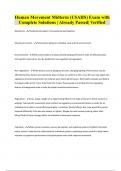
-
Human Movement Midterm (USAHS) Exam with Complete Solutions | Already Passed| Verified
- Exam (elaborations) • 17 pages • 2024
- Available in package deal
-
- $13.48
- + learn more
Movement - fundamental aspect of occupational participation. Movement control: - interactions between individual, task and the environment. Environmental - CNS must be able to analyze activity being performed in order to effectively plan task specific movements. Can be divided into non-regulatory & regulatory. Non-regulatory: - Distractions such as background noise, changing lighting. Performance may be affected by these factors but movement does not have to conform to this. As an OT, you m...
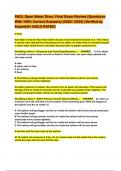
-
PADI, Open Water Diver, Final Exam Review {Questions With 100% Correct Answers} (2024 / 2025) (Verified by Expert(A+ GOLD RATED)
- Exam (elaborations) • 20 pages • 2024
- Available in package deal
-
- $17.99
- + learn more
D float. Salt water is heavier than fresh water because it has dissolved minerals in it. This means it causes more upward force (buoyancy) on an object. An object that is neutrally buoyant in fresh water would float in salt water because there is greater upward force. See Being a Diver I - Buoyancy and Controlling Buoyancy. - ANSWER 1) If an object is neutrally buoyant (does not sink or float) in fresh water, the same object placed into salt water would A sink. B either sink o...
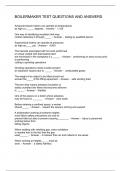
-
BOILERMAKER TEST QUESTIONS AND ANSWERS
- Exam (elaborations) • 6 pages • 2024
-
Available in package deal
-
- $10.99
- + learn more
Advanced steam boilers can operate at temperatures as high a s _____ degrees. - Answer - 1,150 One way of identifying insulation that may contain asbestos is through_____. - Answer - testing by qualified person Supercritical boilers can operate at pressures as high as_____psi. - Answer - 4,500 The hazards associated with hot work performed on areas coated with lead-based paint are minimized in the workplace b y _____. - Answer - performing an area survey prior to performing cu...
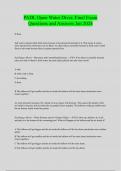
-
PADI, Open Water Diver, Final Exam Questions and Answers Jan 2024
- Exam (elaborations) • 25 pages • 2024
-
- $9.49
- + learn more
D float. Salt water is heavier than fresh water because it has dissolved minerals in it. This means it causes more upward force (buoyancy) on an object. An object that is neutrally buoyant in fresh water would float in salt water because there is greater upward force. See Being a Diver I - Buoyancy and Controlling Buoyancy. - 1) If an object is neutrally buoyant (does not sink or float) in fresh water, the same object placed into salt water would A sink. B either sink or float. C do ...

Study stress? For sellers on Stuvia, these are actually golden times. KA-CHING! Earn from your study resources too and start uploading now. Discover all about earning on Stuvia


